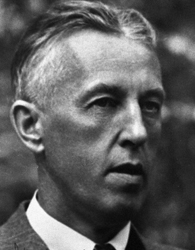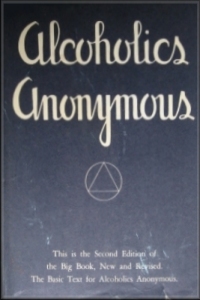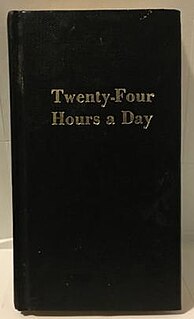
Alcoholics Anonymous (AA) is an international mutual aid fellowship with the stated purpose of enabling its members to "stay sober and help other alcoholics achieve sobriety." AA is nonprofessional, self-supporting, and apolitical. Its only membership requirement is a desire to stop drinking. The AA program of recovery is set forth in the Twelve Steps.
A twelve-step program is a set of guiding principles outlining a course of action for recovery from addiction, compulsion, or other behavioral problems. Originally proposed by Alcoholics Anonymous (AA) as a method of recovery from alcoholism, the Twelve Steps were first published in the 1939 book Alcoholics Anonymous: The Story of How More Than One Hundred Men Have Recovered from Alcoholism. The method was adapted and became the foundation of other twelve-step programs.

Narcotics Anonymous (NA) describes itself as a "nonprofit fellowship or society of men and women for whom drugs had become a major problem". Narcotics Anonymous uses a traditional 12-step model that has been expanded and developed for people with varied substance abuse issues and is the second-largest 12-step organization.

William Griffith Wilson, also known as Bill Wilson or Bill W., was the co-founder of Alcoholics Anonymous (AA).
The Twelve Traditions of twelve-step programs provide guidelines for relationships between the twelve-step groups, members, other groups, the global fellowship, and society at large. Questions of finance, public relations, donations, and purpose are addressed in the Traditions. They were originally written by Bill Wilson after the founding of the first twelve-step group, Alcoholics Anonymous.

Sexaholics Anonymous (SA) is one of several twelve-step programs for compulsive sexual behavior based on the original twelve steps of Alcoholics Anonymous. SA takes its place among various twelve-step groups that seek recovery from sexual addiction: Sex Addicts Anonymous, Sex and Love Addicts Anonymous, Sexual Compulsives Anonymous and Sexual Recovery Anonymous. Collectively these groups are referred to as "S" groups since all their acronyms begin with that letter: SA, SAA, SLAA, SCA, SRA.
James Patrick Kinnon, commonly known as Jimmy Kinnon or "Jimmy K.", was the primary founder of Narcotics Anonymous (NA), a worldwide fellowship of recovering addicts. During his lifetime, he was usually referred to as "Jimmy K." due to NA's principle of personal anonymity on the public level. He never referred to himself as the founder of NA, although the record clearly shows that he played a founding role.

Cocaine Anonymous (CA) is a twelve-step program for people who seek recovery from drug addiction. It is patterned very closely after Alcoholics Anonymous, although the two groups are unaffiliated. While many CA members have been addicted to cocaine, crack, speed or similar substances, identifying specifically as a cocaine addict is not required.
Dry drunk is a colloquial expression which describes an alcoholic who no longer drinks but otherwise maintains the same behavior patterns of an alcoholic. The objective of groups such as Narcotics Anonymous (NA) and Alcoholics Anonymous (AA) is not just to help their members stop abusing drugs and alcohol. It is acknowledged in these programs that addiction is more systemic than a "bad habit" and is fundamentally caused by self-centeredness. Long term membership in Alcoholics Anonymous has been found to reform pathological narcissism, and those who are sober but retain characteristics associated with addiction are known in AA as dry drunks. The term is used by Alcoholics Anonymous in relation to feelings of anger, depression and resentment.
The Hazelden Foundation is a non-profit organization based in Center City, Minnesota. Hazelden has alcohol and drug treatment facilities in Minnesota ; Beaverton, Oregon; Newberg, Oregon; Chicago, Illinois; Naples, Florida and New York City, New York. It offers assessment and primary residential addiction treatment for adults and youth, including extended care and intermediate care, as well as outpatient treatment, aftercare services and a family program. In February 2014, it merged with the Betty Ford Center to form the Hazelden Betty Ford Foundation headquartered in Minnesota.

James Burwell, known as Jim B. or Jimmy B., was one of the Alcoholics Anonymous (AA) founding members. He was among the first ten members of AA on the East Coast, and was responsible for starting Alcoholics Anonymous in Philadelphia and Baltimore. Later in life, he and Rosa, his wife, moved to San Diego, California and was instrumental in the growth of AA there.

Neurotics Anonymous (N/A) is a twelve-step program for recovery from mental and emotional illness. To avoid confusion with Narcotics Anonymous (NA), Neurotics Anonymous is abbreviated N/A or NAIL.

Alcoholics Anonymous (AA) was founded in 1935 by Bill Wilson and Dr. Robert Smith. Subsequently, The history of Alcoholics Anonymous (AA) has been documented in books, movies, and AA literature. This history begins with the group's early struggles and continues through its worldwide growth.

Twenty-Four Hours A Day is a 1954 book written by Richmond Walker (1892-1965), is a book that offers daily thoughts, meditations and prayers to help recovering alcoholics live a sober life. In Alcoholics Anonymous literature Walker became the second most popular A.A. author in total book sales, second only to Bill W. It was often referred to as "the little black book" due to its black cover in the 1960s.
Secular Organizations for Sobriety (SOS), also known as Save Our Selves, is a non-profit network of autonomous addiction recovery groups. The program stresses the need to place the highest priority on sobriety and uses mutual support to assist members in achieving this goal. The Suggested Guidelines for Sobriety emphasize rational decision-making and are not religious or spiritual in nature. SOS represents an alternative to the spiritually based addiction recovery programs such as Alcoholics Anonymous (AA). SOS members may also attend AA meetings, but SOS does not view spirituality or surrendering to a Higher Power as being necessary to maintain abstinence.

Love addiction is a proposed model of pathological passion-related behavior involving the feeling of falling and being in love. A medical review of related behaviors in animals and humans concluded that current medical evidence does not support an addiction model for maladaptive passion-related behaviors. There has never been a reference to love addiction in the Diagnostic and Statistical Manual of Mental Disorders (DSM), a compendium of mental disorders and diagnostic criteria published by the American Psychiatric Association.
Survivors of Incest Anonymous (SIA) is a twelve-step fellowship for recovery from the consequences of childhood sexual abuse. SIA was founded in 1982 in Baltimore, Maryland by women survivors who believed their experience in other twelve-step fellowships could assist in recovery from sexual trauma.

Pills Anonymous (PA) is a twelve-step program for people who seek recovery from prescription drug addiction. PA is patterned very closely after Alcoholics Anonymous, although the two groups are not affiliated.

High Watch Recovery Center is an alcohol and drug addiction recovery center located in Kent, Connecticut. It was the first recovery center in the US founded on the principles of Alcoholics Anonymous (AA).










